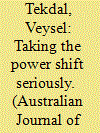| Srl | Item |
| 1 |
ID:
158639


|
|
|
|
|
| Summary/Abstract |
Interpretations of the Belt and Road Initiative (BRI) mostly agree that it is a policy opening that offers some remedies for China's economic and security challenges, as well as reflects China's increasing regional and global ambitions. This paper argues that the multiple drivers characterizing the BRI result from the multiple identities of China as a developing country struggling with several sources of instability and macroeconomic problems and, simultaneously, a regional and an emerging power, and finally a major global power with significant economic capacity to shape the global economic order. The paper aims to substantiate the entanglement of the defensive and ambitious motivations behind the BRI by examining the background against which the Chinese Communist Party leadership has suggested it. In so doing, it draws on Chinese official policy documents and statistics, speeches from Chinese leaders and existing social–scientific research on the transformation of China's economic and political landscape in recent years.
|
|
|
|
|
|
|
|
|
|
|
|
|
|
|
|
| 2 |
ID:
187475


|
|
|
|
|
| Summary/Abstract |
It is widely agreed that recent decades have witnessed a power shift towards the emerging economies. Yet the magnitude of the power shift and its implications for the global economic order are much contested. For some, the diffusion of power has been changing the power relations between the global North and global South as well as within the global South. For others, the emerging economies do not pose a significant challenge to the global North’s dominance in the global political economy as the latter continues to hold structural power advantages in technology, finance, and institutional capacity. This paper contributes to this debate by analysing the changing power relations in the field of development cooperation. As shown by recent work, Chinese development finance, combining a massive scale, global reach, and distinctive modalities, has reshaped the global landscape of development finance. This paper offers an interpretation of this transformation with a focus on power relations. It argues that Chinese development finance has not only decreased the ability of Western development finance institutions to influence policy agendas and preferences in the developing world, but also eroded the latter’s power to shape the governance, norms, and modalities of development cooperation.
|
|
|
|
|
|
|
|
|
|
|
|
|
|
|
|